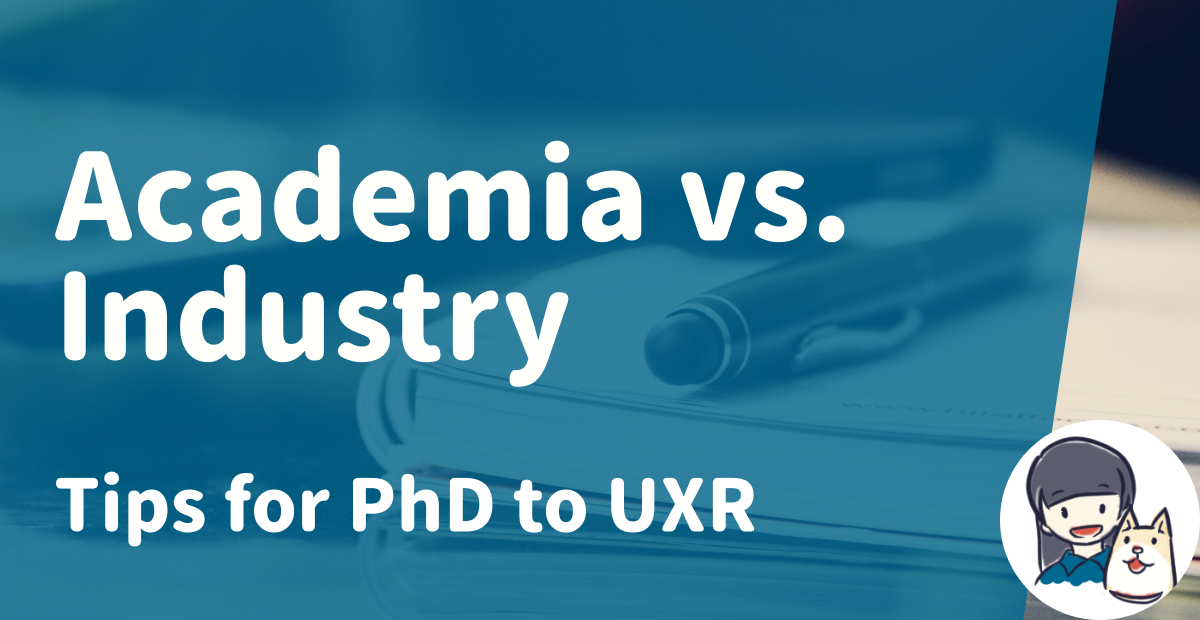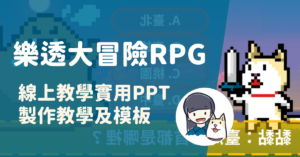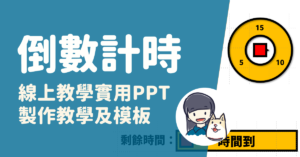It might be rare in Taiwan, but did you know that overseas, many PhDs and professors are moving into industry roles as user researchers?
This post aims to share some insights from my transition from academia to industry, capturing the key differences between the two, as well as my thoughts post-switch. This is for my academic pals who are considering a leap into the industry, as well as my industry comrades thinking about further studies.
On the topic of academic research experience…
I was raised in a family of scholars XD (which basically sounds like my old autobiography).
During my undergrad and master’s programs, I was in the Chinese Literature department focusing on phonetics; for my PhD, I shifted to cognitive linguistics, and completed my doctoral dissertation on multimodal metaphors.
As you can see, over many years (even if we only count my PhD, that’s over 8 years), apart from the two to three years I spent working as a Project Manager and reporter in the media industry, most of my time has been devoted to academic research, with a bit of teaching thrown in.
Academic research has always been a source of joy for me. I remember a few of my professors once told me,
Academia is a solitary journey.
This is absolutely true. Especially in the humanities like Chinese literature or linguistics, a lot of the time you’re really just talking with yourself – no one can truly solve the problems for you. Many people find the process of writing their thesis incredibly painful due to the sheer solitude of the journey, and some even drop out midway.
However, for me, this wasn’t much of an issue – I absolutely loved immersing myself in research.
Of course, there were a lot of extremely challenging parts, but I genuinely enjoyed the thrill of ultimately transforming problems into discoveries 😛
After being busy for so many years (as for why it took over 8 years, that’s a long story…), I finally got my doctorate. So, why am I in the industry now?
Dipping my toes in – starting as an intern
Becoming a professor was one of my childhood dreams.
However, having spent some time in industry (the media industry), I started to contemplate if I could also carve out a career there. Moreover, with the declining birthrate and significant changes in teaching and research roles in recent years, academia, which traditionally focused on the service, teaching, and research, has transformed quite a bit from when it solely concentrated on one or two areas.
These factors, in one way or another, kept prompting me to think about what I truly wanted.
I was extremely happy in the media industry, with a boss who appreciated me and different challenges every day. But since I was writing my thesis at the time, I couldn’t work full time, so I temporarily left the media industry.
During the later stages of my thesis, I had to wait for my advisor to revise my work for over half a year. It was then that I chatted with my senior, Selena, who was working as a Project Manager in the tech industry, about her life in tech. This prompted me to consider whether I could carve out a place for myself in the tech industry as well.
At that time, I was also teaching part-time at the university, so I chose to enter the industry as an intern.
Salary was not as important to me then, what mattered more was the flexible schedule that allowed me to juggle multiple roles.
And then a whole new world was unveiled 😛
Academia vs. Industry
Let me briefly share the differences between academia and industry based on my experience so far.
The following table outlines their differences, and I will explain them in more detail further on. As for topics like salary and work-life balance (WLB), we can discuss those in private XD, so I won’t include them here.
| Academia | Industry | |
| Purpose of research | satisfying curiosity about the world | serving the company’s interests and needs |
| Duration of research | long-term (years or even decades) | short-term (from a few days to one or two months) |
| Stakeholders in research | reviewers who objectively evaluate the research | stakeholders with specific goals and expectations |
| Research methods | meticulous and careful inference | modular and bold inference |
| Presentation of research results | explain every detail in a standard manner | storytelling and highlighting key points |
Purpose of research
In academia, the content of research is driven by our curiosity about the world.
It could be a super niche topic or a globally trending topic in recent years.
Of course, there’s the pressure of applying for funding and promotion, so the selection of research topics might be adjusted to align with reviewers or mainstream academia.
But generally, academic research is about satisfying our curiosity about the world. For example, my doctoral thesis explored the relationship between comics and the senses – to me, that was a super interesting topic XD.
In industry, research serves the company.
The research we conduct aims to improve the company, whether it’s understanding users or optimizing products, the ultimate goal is to increase the company’s value.
Sometimes you really can’t control the topics you want to work on, as research often needs to support the goals and direction of other teams.
Therefore, there’s a significant chance you might end up doing research that you might not be particularly interested in.
Duration of research
In academia, the phrase ‘ten years of dedication for perfection’ is quite normal.
It might take years just to understand the basic concepts and current research trends in a particular academic field, let alone making some achievements, which naturally requires even more time.
My Master’s supervisor once told me that the three years of my Master’s degree are for laying the foundation for my research skills, and the doctoral period is when I really utilize these fundamental abilities to develop my research.
In our humanities academic journals, if one can publish an article a year, it’s already considered highly productive.
In the industry, especially in tech, the timeline for each research project is typically quite short.
Of course, this depends on the different research methods.
If we’re not talking about the preparatory work, Usability Testing can be completed in two or three days, with a report finished within a week.
Simple User Interviews can be wrapped up within a week, with a report completed in two weeks.
For larger or more complex studies, like the Contextual Inquiry I conducted previously, due to the complex content involved, it might take about one to two months.
But compared to academic research, this timeline is much shorter XD.
Stakeholders in research
In academia, the main people involved in your research are the reviewers.
Reviewers typically have no vested interest in your work and scrutinize your research methods, findings, and inferences objectively (though of course, there are also some who might not be so objective XD).
They look into whether there are any problems with your work, whether your research offers any new insights, and so forth.
In industry, your stakeholders are usually your colleagues.
These stakeholders might come from product or commercial teams. They often approach you with certain needs and expectations in mind.
There might be multiple stakeholders, so it’s important to delve into their needs and expectations, clarify what your research can achieve, and explain the anticipated outcomes.
The degree of understanding and trust that the stakeholders have in user research greatly impacts how the research progresses.
Towards the end of your research, you typically need to discuss the next steps with the stakeholders to ensure your research can make a significant impact.
Research methods
In academia, research methods must be rigorous.
From the methodology to the analysis, every detail needs to be meticulously considered.
You have to refer to a lot of previous studies to identify deficiencies in past research and highlight the aspects that could benefit your study.
In the process of inferring insights from findings, you have to be extremely careful.
Even if some content has statistical significance, you typically can’t directly say that there is a relationship between A and B, as there are many variables and possibilities to consider.
In industry, research methods have to consider time, so most methods are modular, allowing research to be completed within a month or two.
This means that, compared to academic research, industry research can be somewhat less rigorous.
For example, many academic studies need to go through ethical reviews at external institutions to ensure the appropriateness of the research topic, selected users, and methods used. However, in industry, once we’ve understood our user needs, we’ll begin the research.
Later in user research, you’ll find that the process of inferring insights from findings is really fast.
In academic reports, I was used to writing in a more conservative way, or using more neutral terms to describe the relationships between two things. However, in industry research, this ‘insight’ usually has to be very insightful, so I have to spend a lot of time adjusting to this aspect.
Presentation of research results
In academia, research results are usually presented in a ‘conventional’ manner.
Essentially, every field has certain presentation standards, especially when writing reports. Most of them include: introduction, methodology, result, discussion, conclusion. There may be slight adjustments, but the placement and content to be aware of in each part are generally agreed upon.
In the write-up, previous achievements are clearly stated, followed by our findings, the relationship between data, and finally, the results are derived.
In industry, research results need to be concise and to the point, even better if they provide a refreshing perspective. Therefore, the ability to ‘tell a story’ is very important.
In academia, I was even taught not to highlight key points for professors or readers because they might feel they’re being treated like fools 😛
But in the industry, we must highlight key points for our stakeholders in neon colors, distilling information, visualizing…whatever it takes to allow them to quickly grasp the essentials.
Many minor details and inferences are often only reviewed when they have plenty of time.
Another difference is that we also need to make recommendations based on these research results, unlike in academic research, where the study is just presented as is, and how to handle it is left up to the reader.
After completing research in the industry, it’s common to be asked by stakeholders: ‘So, what do you recommend?’
At this point, we not only need to ensure the credibility of the research results, but also need to understand the stakeholders’ areas of expertise, past projects, etc., to suggest more feasible solutions.
Tips for transitioning from academia to the industry
The differences between stepping into the industry from academia have been outlined above.
In Taiwan, it’s perhaps less common to hear about academics transitioning into industry roles, but this is quite popular internationally.
Quite a few PhD students, even professors, are making the switch to the corporate world. Many renowned companies have researchers who’ve transitioned from an academic background.
However, as there aren’t as many academics in Taiwan transitioning into UX researcher roles, there’s a degree of skepticism towards such professionals from the local businesses.
While doing Mentorship on ADPList, I’ve heard from mentees who said they’ve faced doubts about this during interviews.
I highly recommend a wonderful Facebook group: “PhD to UXR – from academia to UX research“. Many people share their transition experiences there and it’s a common place for members to seek assistance directly. It’s a really supportive community!
To conclude, if you’re seriously considering making the jump from academia to the industry, there are certain things you can pay attention to and prepare for.
I’m still learning a lot of this myself, so feel free to share and exchange ideas :’)
Research Ability
If you’ve already done research in academia, the research skills required in the industry won’t be a problem at all.
Indeed, we may need to spend some time getting to grips with important industry benchmarks, terminology, and research methods, but once we’ve learned these, there won’t be any major issues.
As mentioned earlier, our research abilities have been established during our master’s years.
We know clearly how to set research objectives, scope, how to refer to past literature, and how to interpret results.
So, please don’t doubt these inherent academic abilities you’ve got 🙂
Research Purpose and Timeline
Entering the industry, we constantly need to adjust the purpose of our research.
The goal isn’t just to solve our own problems but to resolve whatever the company is hoping for us to address.
Essentially, the aim of the research must be swift, sharp, and accurate.
Completing research within a short period is crucial to meet the needs of the company and its stakeholders.
Presentation of Research Findings
Storytelling is crucial.
How to make your research results impactful is really important.
If we start our report with Introduction, Methodology, our stakeholders will definitely doze off right away XD.
It’s essential to make research reports easily understandable.
Feel free to experiment with highlighting key points, using visualizations, or any other methods that might help simplify the information.
Conclusion
Transitioning from academia to industry, many friends have asked me why I made such a choice, and I’ve experienced a mix of highs and lows.
However, I have absolutely no regrets about my decision, and although I’m currently in industry, my heart still lingers in academia.
After all, the sea of knowledge is just too enchanting XD.
If you’re also in academia and thinking about stepping into the industry, or if you’re a former academic who’s already in the industry, feel free to reach out and chat with me :D.
Thank you:D
If you like this post, please help me to Clap Your Hands 5 times below
The clap is totally free! It not only encourages me but also gives me Likecoin!
Just simply sign-up/log in to your account (you can register via Facebook or Google). Thank you in advance 😀



